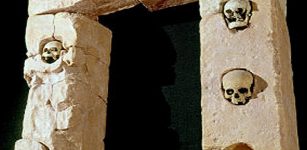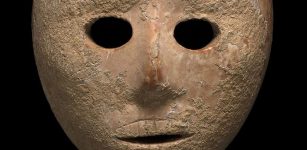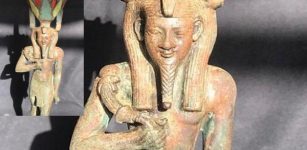Kahina – The Prophetic Berber Queen Who Resisted The Muslim Invasions Of The Numidia Kingdom
Ellen Lloyd - AncientPages.com - The legendary Berber Queen Kahina was a strong woman with the courage and will to resist the Muslims when her kingdom was invaded. The odds of succeeding were low, but being a great warrior and military leader, she did what was in her power to protect her people from a hostile force.
Dihya, whose Arabic Al-Kahina name can be translated as 'the diviner," was believed to be capable of foreseeing the future. She was born in the 7th century in modern Algeria and ruled a free Berber state known as Numidia.
There are many historical stories and legends about the Berber Queen Kahina who became a heroine in her country. Credit: Adobe Stock - Warpedgalerie
Many historical accounts mixed with unconfirmed legends make it hard to determine the true origin of the brave Berber Queen Kahina. Some historians suggest she may have been of Jewish origin, but most scholars think she was a Christian.
According to Arabic sources, Kahina was credited with prophetic abilities and was believed to be a sorceress. Even her physical appearance and family ties are based on doubtful accounts. She may have a large woman with long hair and possibly three sons. There is no credible historical information about her parents. Some think she was adopted.
When defending her kingdom Numidia, she showed outstanding braveness, which is why Al- Khanina became an Algerian heroine.
According to Arabic sources, Al- Khanina and Kusayla (Kusaila), a 7th-century Berber Christian king of the kingdom of Altava and leader of the Awraba tribe of the Imazighen, fiercely resisted the Muslims, and both are presented as Algerian heroes.
"North Africa had been under a foreign yoke. The Berbers, anxious for liberty and freedom, were incessantly fighting the invaders. Such was the case with the Berbers under the leadership of Kusayla and the Kahina during the Arab conquest. But this time, the Berbers did not know the intentions of the Arabs; they thought they were like other invaders seeking only to exploit their land. This is why the Berbers fought them in the beginning." 1
This was the wrong assumption, however. The Arab's conquest aimed to spread Islam and free the Berbers from the Byzantine Empire.
There are different opinions about why the Berbers resisted the Muslims. One possibility, according to historians, is that the Berbers "fought the Arabs not because they were Arabs, but because they were an unknown invader who, in the Berber's mind, were no different from the Romans." 1
Another explanation may be that "the Berber view of the Arabs undergoes a gradual transformation. Whereas at first, they regarded the Arabs as foreign oppressors, they in time came to view them as just and generous liberators, as the harbingers of civilization. The Berbers realized that the new conquerors were completely different from the previous ones: they also realized that for the first time they were considered masters. "1
Kusayla led the first resistance and established the Kingdom of the Berbers. After his death, Kahina assumed power and continued fighting the Muslims. She managed to burn a few villages and destroy crops, but her military encounter with Hasan ibn al-Nu'man, marching from Egypt and capturing the major Byzantine city of Carthage and other cities, was troublesome.
Statue of Dyhia in Khenchela, Algeria. Credit: Numide05 - CC BY-SA 1.0
In 698, the Arab general of the Umayyad Caliphate Hasan ibn al-Nu'man marched with his military forces into the Numidia Kingdom, which the ancient historical city of Djémila was part of. He had been told the region was protected by the Queen of the Berbers, Kahina.
Kahina managed to avoid a direct confrontation with Hasan ibn al-Nu'man for a while, but he followed her persistently until she finally accepted the fight. The clash was bitter, and the Kahina was fatally wounded.
There are many stories about Kahina, and some offer contradicting information making it hard to say how she died. According to some sources, the Berber Queen died fighting the invaders, sword in hand. Other accounts tell Kahina she committed suicide by swallowing poison rather than being taken by the enemy.
Whatever the truth, there is no doubt she fought courageously and became a legendary heroine in her country.
Updated on January 21, 2023
Written by - Ellen Lloyd – AncientPages.com
Copyright © AncientPages.com All rights reserved. This material may not be published, broadcast, rewritten or redistributed in whole or part without the express written permission of AncientPages.com
Expand for references- Hannoum, A. (1997). Historiography, Mythology and Memory in Modern North Africa: The Story of the Kahina. Studia Islamica,(85), 85-130
- Phillip C. Naylor - North Africa: A History from Antiquity to the Present
More From Ancient Pages
-
 Ancient Campfires Reveal A 50,000-Year-Old Grocer And Pharmacy In Australia
Archaeology | Apr 14, 2022
Ancient Campfires Reveal A 50,000-Year-Old Grocer And Pharmacy In Australia
Archaeology | Apr 14, 2022 -
 10 Divine Weapons Of The Gods
Featured Stories | Jul 28, 2015
10 Divine Weapons Of The Gods
Featured Stories | Jul 28, 2015 -
 Evidence The Khufu Channel Aided The Construction Of The Giza Pyramids Found – Scientists Say
Archaeology | Aug 31, 2022
Evidence The Khufu Channel Aided The Construction Of The Giza Pyramids Found – Scientists Say
Archaeology | Aug 31, 2022 -
 Dozens Of Unique 2,500-Year-Old Ceremonial Treasures Discovered In A Drained Peat Bog
Archaeology | Jan 27, 2023
Dozens Of Unique 2,500-Year-Old Ceremonial Treasures Discovered In A Drained Peat Bog
Archaeology | Jan 27, 2023 -
 Sir Walter Raleigh ‘Self-Portrait’ Discovered Behind Walls In The Tower Of London
Archaeology | Nov 5, 2018
Sir Walter Raleigh ‘Self-Portrait’ Discovered Behind Walls In The Tower Of London
Archaeology | Nov 5, 2018 -
 Prehistoric Evidence Of Sophisticated Prosthetics In Ancient Egypt – Artificial Toes Helped Egyptians Walk
Archaeology | Feb 20, 2014
Prehistoric Evidence Of Sophisticated Prosthetics In Ancient Egypt – Artificial Toes Helped Egyptians Walk
Archaeology | Feb 20, 2014 -
 Submerged Wreck Of Mayan Slave Ship Identified By INAH Researchers
Archaeology | Sep 23, 2020
Submerged Wreck Of Mayan Slave Ship Identified By INAH Researchers
Archaeology | Sep 23, 2020 -
 Explorers Of Lost City Of The Monkey God Contract Unusual Flesh-Eating Disease
Archaeology | Jan 22, 2017
Explorers Of Lost City Of The Monkey God Contract Unusual Flesh-Eating Disease
Archaeology | Jan 22, 2017 -
 4,500-Year-Old Lost ‘Sun Temple’ Dedicated To God Ra Unearthed In Abu Gorab Necropolis
Archaeology | Aug 4, 2022
4,500-Year-Old Lost ‘Sun Temple’ Dedicated To God Ra Unearthed In Abu Gorab Necropolis
Archaeology | Aug 4, 2022 -
 Time Capsule – Best Preserved 3,000-Year-Old Dwelling Ever Found In Britain
Archaeology | Jan 12, 2016
Time Capsule – Best Preserved 3,000-Year-Old Dwelling Ever Found In Britain
Archaeology | Jan 12, 2016 -
 Serket: Scorpion Goddess Who Could Heal Poisonous Bites And Sting Evildoers
Egyptian Mythology | May 17, 2019
Serket: Scorpion Goddess Who Could Heal Poisonous Bites And Sting Evildoers
Egyptian Mythology | May 17, 2019 -
 Ancient DNA Reveals How People Migrated During The Roman Empire
DNA | Feb 1, 2024
Ancient DNA Reveals How People Migrated During The Roman Empire
DNA | Feb 1, 2024 -
 Ancient Cult Of Human Skulls And Communication With The Other World
Ancient Traditions And Customs | Mar 21, 2019
Ancient Cult Of Human Skulls And Communication With The Other World
Ancient Traditions And Customs | Mar 21, 2019 -
 Stunning 3,400-Year-Old Palace Of the Kingdom Of Mitanni Discovered Thanks To Drought
Archaeology | Jun 27, 2019
Stunning 3,400-Year-Old Palace Of the Kingdom Of Mitanni Discovered Thanks To Drought
Archaeology | Jun 27, 2019 -
 Impressive 9,000-Year-Old Stone Mask Uncovered In Southern Hebron Hills, Israel
Archaeology | Nov 30, 2018
Impressive 9,000-Year-Old Stone Mask Uncovered In Southern Hebron Hills, Israel
Archaeology | Nov 30, 2018 -
 Man-Made Square Burial Cave Dated To Rameses II-Era Accidentally Found In Israel
Archaeology | Sep 19, 2022
Man-Made Square Burial Cave Dated To Rameses II-Era Accidentally Found In Israel
Archaeology | Sep 19, 2022 -
 Mysterious Disappearance Of King Aegeus Of Athens After His Wedding
Featured Stories | Aug 1, 2022
Mysterious Disappearance Of King Aegeus Of Athens After His Wedding
Featured Stories | Aug 1, 2022 -
 Goddess Xi Wangmu (Xiwangmu) Who Controlled Life, Death, Creation And Talked Directly To Humans In Chinese Mythology
Chinese Mythology | Mar 12, 2020
Goddess Xi Wangmu (Xiwangmu) Who Controlled Life, Death, Creation And Talked Directly To Humans In Chinese Mythology
Chinese Mythology | Mar 12, 2020 -
 Carved Statue Of God Nefertum Unearthed In Egypt’s Saqqara Necropolis
Archaeology | Oct 3, 2020
Carved Statue Of God Nefertum Unearthed In Egypt’s Saqqara Necropolis
Archaeology | Oct 3, 2020 -
 On This Day In History: 3,106-Carat Diamond Found – On Jan 25, 1905
News | Jan 25, 2017
On This Day In History: 3,106-Carat Diamond Found – On Jan 25, 1905
News | Jan 25, 2017


